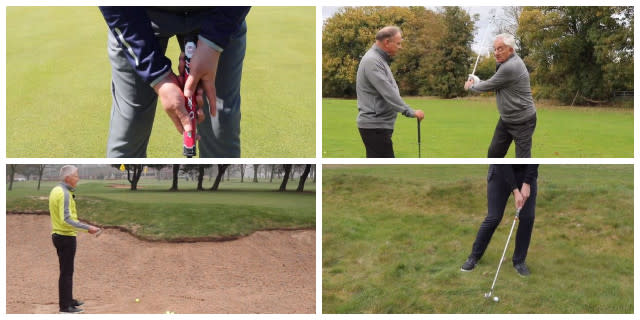Time for Golf to Promote Nine-Hole Competitions?
Post by Golf Author Barry Rhodes who is an expert on the rules of golf and author of two books, ‘999 Questions on the Rules of Golf’ / ‘999 More Questions on the Rules of Golf’.
Following an extensive pace of play survey conducted by The R&A, between September 2014 and March 2015, which attracted more than 56,000 responses from 127 countries, Martin Slumbers, Chief Executive of The R&A. said;
“We know that the time it takes to play golf is one of the barriers preventing many people from getting involved in the sport.”
For some time, I have held the opinion that there are significant numbers of golfers who would prefer not to spend 5-6 hours away from their homes and families every time they play a round of golf. Five and a half hours is a conservative, estimated time for a player to travel to the course, play 18 holes, enjoy a minimal post-round refreshment with fellow competitors and travel home again. My opinion is reinforced by one of the many statistics that emerged from the above mentioned survey, which was that 60% of respondents expressed the view that they would enjoy golf more if they played in less time. Of course, some of these respondents were probably implying that they would prefer that 18 holes be completed quicker, with an improved pace of play. However, I think that the root cause is deeper than this. Society has changed considerably over the past 20 years, especially in those countries where golf has been played for 100 years or more. There are many more leisure pursuits competing for our limited available time and many of us want to indulge in a wider variety of activities that interest us. I agree with Jerry Tarde, Chairman of Golf Digest, who said;
"Every other recreation, it seems, takes two hours: movies, dinner, cocktail parties, tennis, bowling, going to the gym. If golf were invented today, it would be a nine-hole game. By no means are we questioning 18 holes, but our culture dictates shorter blocks of free time. I'd rather squeeze in nine holes than none."
History
Traditionally, a round of golf has been over 18 holes, based on the development of the Old Course at St Andrews back in 1764, when there were 10 holes, of which the middle 8 holes were played twice making a round of 18 hole. The 18-hole round was the default round for a golf match from 1933. However the 'stipulated round' of 18 holes was not embodied in the Rules of Golf until 1950. Interestingly, in 1919, when the Royal and Ancient took over sole control of running the Open, half of all the golf courses in Britain were still built as 9-hole courses.

Since I first became interested in promoting the idea of more competitions being run over nine holes I have received favourable support from several different groups of golfers, including; seniors who find it difficult to complete 18 holes; workers who like the idea of a shortened round either early morning or mid/late afternoon; young parents who cannot leave their children with their partners for a game of 18 holes; homemakers and retirees who can fit in nine holes between their duties; juniors and youths who can spend a couple of hours on the course post school/college and pre home study or socialising. Finally, there is that extremely important group of potential players that have not yet started playing golf and are put off by knowing how much time they would have to commit to play 18 holes. There is no doubt in my mind that the nine-holes round is a great way to introduce non-golfers to our wonderful game.
Handicap Rules
Many Club and Society golfers may assume that there is no way of maintaining a handicap when only playing nine-holes rounds, because this was the case until a few years ago. However, nine-hole scores are now eligible for handicap purposes in all the five main handicapping systems, including the CONGU Unified Handicap System for golfers in UK and Ireland. This is an extract from the current CONG manual;
“Evidence from golf clubs indicates that a significant number of Members, due to increasing demands in their working and family life for example, are unable to play 18 hole Qualifying Competitions frequently enough to establish and maintain a handicap representative of their potential ability. Consequently, in response to the changing needs of the game and the Members of our Affiliated Clubs, Qualifying Competitions over Nine-Holes continue to be offered within the UHS to provide additional opportunities for the return of Qualifying Scores.
Nine-Hole Qualifying Competitions are proving to be particularly attractive to clubs and their Members in summer evenings and in the restricted daylight hours of winter weekends. They are also the means by which a greater number of senior golfers are making returns for handicap purposes.
The format for Nine-Hole Qualifying Competitions is Stableford with a 'neutral’ 18 points for the nine unplayed holes being added to the Nine-Hole Stableford score. Whilst the UHS offers opportunities to play Nine-Hole Qualifying Competitions there is no desire to change the traditional way in which competitive golf is played over 18 holes.”
Unsurprisingly, the Rules of Golf are exactly the same for 9-hole competitions as for 18-hole competitions, but I will draw your attention to one important fact, which may catch some players out. Decision 6-2b/0.5, Meaning of "Handicap" When Full Handicap Not Used, states;
Q. It is the condition of a stroke-play competition (e.g., four-ball) that players will not receive their full handicap allowances. Under Rule 6-2b, what is the player responsible for recording on his score card?
A. He must record his full handicap. It is the Committee's responsibility to apply the condition of competition to adjust his handicap.
This means that players have to put their full handicap on their score card when playing in a nine-hole competition. The Committee is responsible for the addition of scores and application of the handicap recorded on the score card, Rule 33-5.
If you have read this article and are supportive of its aims, I encourage you to spread the word in your Club or Society, particularly amongst the competition Committees who may not realise that nine-hole rounds can be eligible for handicap purposes.
Good golfing,
Barry Rhodes
Related Content:






















